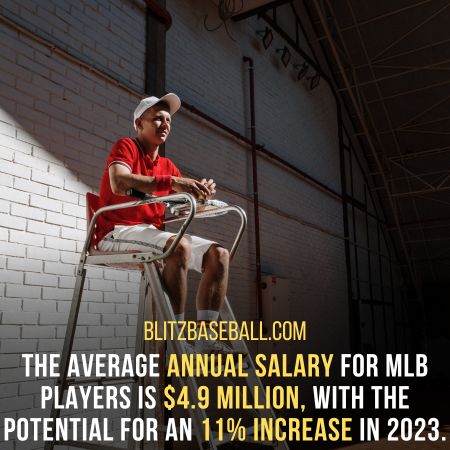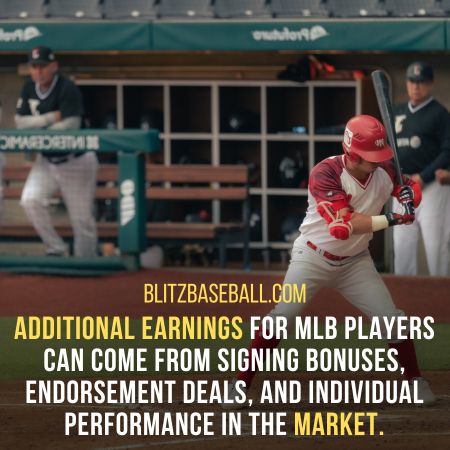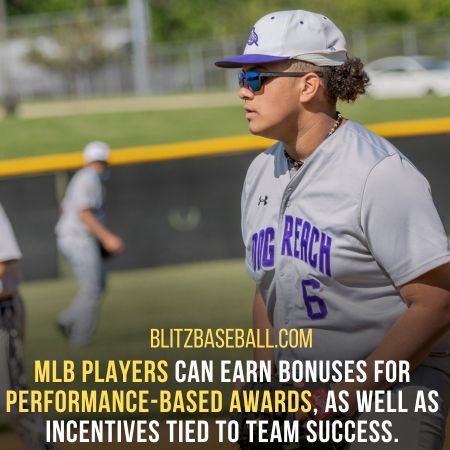Many fans might wonder how much money do baseball players make annually. Baseball players in the MLB earn an average annual salary of $4.9 million. MLB players can also earn bonuses for performance-based awards, and incentive clauses tied to team success can provide additional bonuses.
Signing bonuses are one-time payments for joining a new team, and endorsement deals can supplement players’ income. On the other hand, minor leaguers’ annual wage is only about $6,000 on average, but a new collective bargaining agreement will provide them with offseason pay and a higher minimum salary.
The New York Mets had the highest salary in baseball, totaling $355 million, and seven teams exceeded $200 million in total salary. MLB players earn more than players in other professional baseball leagues like the Nippon Professional Baseball and Korea Baseball Organization, due to variations in competition and market size.
MLB players also receive benefits such as top-of-the-line medical care, travel accommodations, and performance-based bonuses, in addition to their salary.
Factors affecting player salaries include talent, experience, marketability, performance on the field, fan appeal, social media following, and popularity.
Key Takeaways
- The average annual salary for MLB players is $4.9 million, with the potential for an 11% increase in 2023.
- The New York Mets had the highest salary in baseball at $355 million, and seven teams surpassed $200 million in total salary.
- MLB players can earn bonuses for performance-based awards, as well as incentives tied to team success.
- Additional earnings for MLB players can come from signing bonuses, endorsement deals, and individual performance in the market.
How Much Money Do Baseball Players Make?
MLB players earn an average annual salary of $4.9 million, and this amount could potentially increase by 11% in 2023.
In addition to their base salary, players can also earn performance-based bonuses and endorsement deals. Performance-based bonuses are incentives tied to individual achievements, such as making the All-Star team or winning a Gold Glove Award. These bonuses provide players with opportunities to increase their earnings based on their on-field performance.
Furthermore, endorsement deals can significantly supplement players’ income. Popular players often sign lucrative contracts with companies to promote their products, ranging from sports equipment to clothing brands. These endorsement deals can be highly profitable, especially for players who have a large fan base and a strong presence on social media.

Overall, the combination of salary, performance-based bonuses, and endorsement deals allows MLB players to earn substantial incomes.
Minor League Salaries and Benefits
Minor leaguers’ salaries are significantly lower than those of their MLB counterparts. MLB players earn an average annual salary of $4.9 million, while minor leaguers make only about $6,000 on average.
This substantial difference in pay is due to the impact of the collective bargaining agreement. The recent agreement between the MLB and the minor league player development system has brought about positive changes for the minor leaguers.
Under the new deal, minor leaguers will receive offseason pay and a higher minimum salary, providing them with better financial security. This agreement recognizes the importance of investing in the development of young talent and ensuring fair compensation for their efforts.
It is a step towards improving the overall conditions and opportunities for minor league players in their pursuit of a career in professional baseball.
Salary Comparisons with Other Leagues
When comparing salaries, it is evident that MLB players earn significantly more than their counterparts in other professional baseball leagues. The salary disparities among MLB players and players in international baseball leagues like Nippon Professional Baseball (NPB) and the Korea Baseball Organization (KBO) are quite substantial.
While the average annual salary for MLB players is around $4.9 million, players in NPB and KBO earn significantly lower amounts. These disparities can be attributed to variations in competition and market size. MLB players are recognized as some of the finest in the world, and the larger market teams bring in more revenue, allowing for higher salaries.

However, it is important to note that even within the MLB, there are salary disparities among players based on talent, experience, and marketability.
Factors Affecting Player Salaries
Talent, experience, ticket sales and marketability are key factors that determine professional baseball players’ salaries. The influence of player agents and the impact of team revenue sharing also play a significant role in shaping player salaries. Here are four important points to consider:
-
Player Agents: Player agents negotiate contracts on behalf of their clients, seeking the best possible deals. They use their knowledge of the market and expertise in contract negotiations to secure higher salaries for players.
-
Team Revenue Sharing: Revenue sharing is a system in which wealthier teams provide financial support to smaller-market teams. This helps level the playing field and ensures that all teams have the means to compete. The distribution of revenue affects a team’s ability to offer higher salaries to its players.
-
Performance-based incentives: Many contracts include performance-based bonuses, such as reaching certain statistical milestones or winning individual awards. These incentives provide players with additional earning potential based on their on-field performance.
-
Market demand and popularity: Players with a strong fan base and a high level of marketability are often able to command higher salaries. This can be influenced by factors such as social media following, endorsements, and overall popularity among fans.
The combination of talent, experience, marketability, the influence of player agents, and the impact of team revenue sharing all contribute to the determination of professional baseball players’ salaries.

Frequently Asked Questions
How do MLB players negotiate their contracts?
MLB players negotiate their contracts by considering factors such as their performance, market value, and team’s financial situation. They work with agents to secure the best possible salary, incentives, and contract clauses that protect their interests and maximize earnings.
Are there any restrictions on how players can spend their earnings?
There are no specific restrictions on how MLB players can spend their earnings. However, some players may have personal financial advisors who help them manage their money. While some players make extravagant purchases, others invest or save for the future.
Can MLB players invest their earnings in other ventures?
MLB players have the opportunity to invest their earnings in various ventures, allowing them to diversify their income. This can include real estate, stocks, businesses, or other investment opportunities that can provide long-term financial stability.
Do players receive any retirement benefits or pensions?
Baseball players are eligible for retirement benefits and pension plans. These plans provide financial security for players after they retire from the sport, ensuring they receive ongoing income and support post-career.
How do MLB players handle taxes on their earnings?
MLB players handle taxes on their earnings through tax planning and taking advantage of tax deductions. They work with financial advisors to minimize their tax liability and maximize their after-tax income.
Conclusion
In conclusion, baseball players in the MLB earn substantial salaries, with an average annual income of $4.9 million. The New York Mets had the highest salary in the league, reaching $355 million, while seven teams exceeded $200 million in total salary.
Minor league players, however, earn significantly lower wages, with an average of only $6,000 per year. Despite this discrepancy, a new collective bargaining agreement aims to improve their pay and benefits.
MLB players also enjoy additional perks such as top-notch medical care, travel accommodations, and performance-based bonuses.
Various factors like talent, experience, marketability, and fan appeal play a role in determining player salaries.
